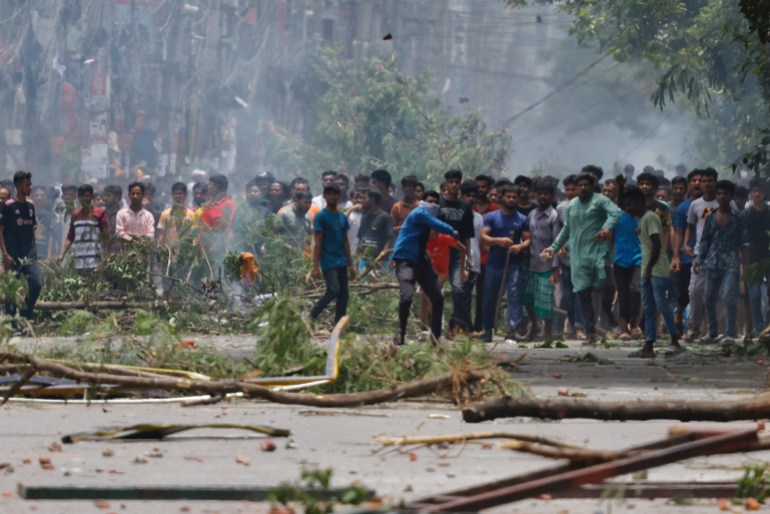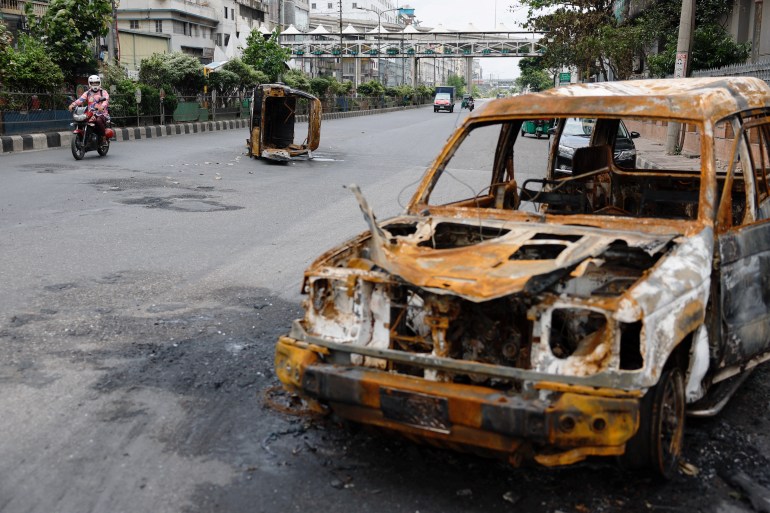The protesters insist that they will not be affected by the change in the government’s system of employment; they want the curfew lifted, the prisoners freed.
Protesters in Bangladesh have issued the petitions amid a lull in violence that has filled the streets in recent days after the government backed government job cuts.
Student leaders said on Monday that they plan to continue the protest despite the Supreme Court’s decision the previous day to reduce the controversial job quota system that sparked the protests. The government’s negative publicity ahead of the decision saw 163 people reported killed, hundreds arrested and thousands injured.
The protesters demanded that the government release protest leaders, lift the curfew, and reopen universities, which had been closed since Wednesday. They said they will give the government 48 hours to meet the demands.
Protesters were attacked by security forces, along with other students who support the ruling Awami League party, last week when they launched their petition against the quota system, which sought to reserve for their relatives veterans and other groups jobs required by the government.
Although the court canceled most of the quotes, the protesters wanted to be responsible for this process, including the resignation of the ministers.
They have also requested that the sentence be made legal as soon as possible. Law Minister Anisul Huq promised on Sunday that the government would implement the legal changes within days.
Problems
Like Sunday, the curfew imposed during the protests was relaxed for a few hours on Monday to allow people to buy essential items. However, Internet connections remained down for the fourth straight day in the nation of 170 million.
After a nationwide shutdown was called on Monday by protesters, soldiers continued to roam the streets and tanks were parked on the streets of the capital Dhaka. There were no more reports of killings or mass gatherings in the afternoon as the silence continued.
Bangladesh’s army chief on Monday said the situation was “under control”. “The law and order situation is now under control after the deployment of the army,” General Waker uz Zaman said in a statement after inspecting troops in several areas in Dhaka.

Meanwhile, protest leader Nahid Islam, who was injured and beaten and is being treated in a hospital in Dhaka, told the AFP news agency on Monday that he feared for his life.
The 26-year-old sociology major leads Students Against Discrimination, a large group that organizes protests against employment conditions. The group suspended the protest for 48 hours on Monday, with Nahid saying he did not want to see “more blood, more killings, more damage to life and property”.
“I and many other coordinators are scared for their lives,” he said, pointing to a large purple wound on his right hand. “Several of my co-ordinators are missing.”
Nahid accused the authorities of “irresponsible behavior”, “inflammatory statements” and repression, blaming them for the escalating tension.
“People are expressing their anger towards the government. We want justice for the people who were martyred in this movement and were injured,” he said.
“Ministers, heads of law enforcement agencies who ordered the attack, the shooting, we want them to resign.”

The protest came amid a shaky economic climate. While Bangladesh’s economy has grown since 2009 under Prime Minister Sheikh Hasina’s four terms, it faces major challenges, including inflation and high youth unemployment.
Hasina has also been accused of authoritarianism and human rights abuses, allegations her government has denied. Anti-government protests have posed a major challenge to his rule.
Amid the protests, the government stepped up its crackdown on opposition parties, with at least 70 people arrested among the Bangladesh Nationalist Party.
The job quota system, previously set aside by the government but renewed by the court last month, would have given 30 percent of government jobs to relatives who fought in the war for independence from Pakistan in 1971.
Once cut, 93 percent of public sector jobs will go to qualified recruits, with 5 percent reserved for military family members. Another 2 percent will be reserved for ethnic minorities or people with disabilities.
#Protesters #Bangladesh #deliver #demands #shaken #silence
